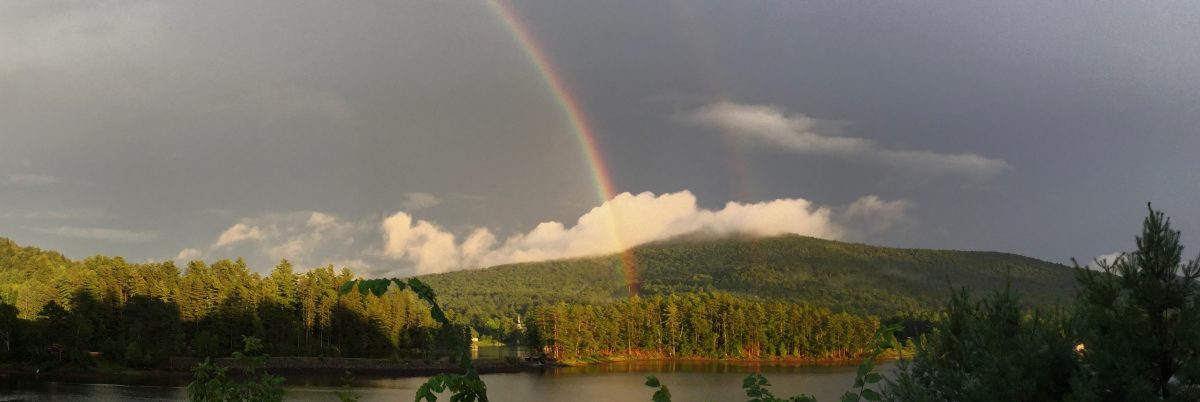Jack was jogging through his local county park one grey afternoon when he felt an intense pain run down his left arm. Slowing his pace he turned down a wooded path that led back to his car. The light grew dimmer, and then, much to his surprise, the sun appeared and he noticed a wall on each side that he’d never seen before. At the end was a white gate, then a green garden filled with sunshine.

When Jack reached the gate a kind-faced woman opened it, smiled and said, “Welcome Jack. I’m Marie. They’re expecting you. Please sit over by the flowering tree and someone will be right with you.”
Then she walked about 30 yards, went through a door in a hedge, and was gone.
Jack knew he should be disturbed by these strange circumstances, yet he wasn’t. He felt uncommonly relaxed. He was wondering what tree produced such colorful and fragrant blossoms, and where his car had gone, when a young handsome man approached him.
“Welcome, Jack,” he said. “I’m Elias. I just want to ask you a few questions and your escort will take you to your room. Do you have any favorite colors?”
“Well, I really like yellows, bright blue and white. But why do you want to know?” asked Jack.
”We’re getting your place ready for you,” Elias said as he made notes in a file folder. “What view do you prefer: woods, fields, mountains, lake?”
“Lake, please,” said Jack. “But tell me, why am I here? Am I dead?”
“Not anymore,” Elias said.“You had a heart attack on the jogging path. When you walk through the door in the hedge you will enter unending life. There is just one thing you will do before you go to that door. It is our custom here to let the newest arrival greet the next arrival, as Marie greeted you. I’ll stay here with you until he arrives.”
Jack couldn’t tell how long they waited. It seemed to him that time was no longer important. He felt content and joyful like never before. He wanted to sit there forever. Then he heard steps approaching the gate. Elias took out another file and said, “This is Mike. Please open the gate and let him in.”
Jack happily walked toward the gate, but when he saw Mike, everything changed.
A volcano of fear, grief, hate and anger erupted inside Jack. He reheard the shouts, the shots, the explosive crash, saw the blood everywhere and felt the cold face of the friend he loved.
“No!” he cried. “No! I can’t let him in. Elias, don’t you know what he did?”
Elias’s eyes spoke understanding, but his voice was steady and low. “No, I don’t know.”
“Don’t you have his record?” insisted Jack incredulously.
“No, we don’t. All records were destroyed by our Lord.”
“There must be a record somewhere,” Jack insisted.
“Oh, yes, there is, but it’s not here. The Accuser has it. He saves everything.”
“The Accuser?”
“Yes, the Accuser. In Hebrew he’s called Satan.”
“Wait, you have some records. When I got here you knew my name and some of my history.”
“Oh, yes, of course we know some things, like when you started to follow the Lord. Let me see. Michael Sullivan. Born again April 18, 2021, McCreary Prison, Lexington, Kentucky.”
“You have prisoners here?!” Jack exclaimed.
“Oh, no! We don’t imprison anyone. That would be the other place. So, are you going to let him in?”
“Look, I don’t see why I am under any obligation to open the door for Mike. That would be like saying I forgive him for what he did to me.”
“Precisely”
“But I never agreed to that.”
“Oh, but you did. Thousands of times.”
“Thousands of times? When?”
“Did you ever pray the prayer the Lord taught his disciples?” Elias asked. “You call it the Lord’s Prayer.”
“Of course I’ve prayed it. Ever since I was a kid. We even used to pray it in school when I was little. What’s that got to do with this?”
After a pause, Elias continued, “Did you pray ‘forgive us our trespasses as we forgive those who trespass against us?’”
After a long silence Jack admitted he had.
“Well, then,” Elias said. “Forgive Mike the way our Lord has forgiven you…totally.”
“But that’s impossible,” Jack wailed.
“God never asks us to do impossible things. Hard, but not impossible.”
“But, can’t I ask God to forgive me even if I can’t forgive Mike?”
“Let me ask you something, Jack. Do you remember the story of the prodigal son? Even when his father begged him, the older son refused to join the party.”
Jack quickly glanced at Mike, waiting to be let in, and nodded.
“Do you still have the letter?” Elias asked.
Jack knew what letter Elias meant, the letter from the Victim-offender Reconciliation Program at the prison.
“Look,” continued Elias. “the door to unending life is right over there. It’s called forgiveness. It’s not called, “I forgive” or “I’m forgiven” it’s simply called “forgiveness.” You either want to go there, or you don’t. As soon as you let Mike in you can go together.”
Jack shook his head. “I can’t. I’m not ready. I need more time.”
“You want more time, Jack?” Elias asked.
Jack nodded.
“Granted.”
Jack felt his body lift and fall. Glaring lights blinded him. He heard a “beep, beep, beep” over his head.
“He’s back,” exclaimed a woman in blue scrubs.
‘Oh, no!” thought Jack. “What have I done?”
***********************
Be kind to one another, tenderhearted, forgiving one another, as God in Christ forgave you. Ephesians 4:32
And whenever you stand praying, forgive, if you have anything against anyone, so that your Father also who is in heaven may forgive you your trespasses. Mark 11:25










